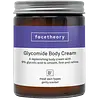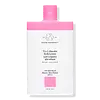What's inside
What's inside
 Key Ingredients
Key Ingredients

 Benefits
Benefits

 Concerns
Concerns

 Ingredients Side-by-side
Ingredients Side-by-side

Water
Skin ConditioningGlycolic Acid
BufferingSodium Lactate
BufferingGlycerin
HumectantOryza Sativa Bran Oil
EmollientStearic Acid
CleansingGlyceryl Stearate Se
EmulsifyingPolyglyceryl-6 Stearate
EmollientCetyl Alcohol
EmollientVaccinium Macrocarpon Seed Oil
Skin ConditioningSimmondsia Chinensis Seed Oil
EmollientCitrus Aurantium Bergamia Peel Oil
Limonene 0.226%
PerfumingLinalool 0.075%
PerfumingCitral 0.008%
PerfumingPolyglyceryl-6 Behenate
Emulsion StabilisingCetyl Hydroxyethylcellulose
Emulsion StabilisingTocopherol
AntioxidantXanthan Gum
EmulsifyingOlive Glycerides
EmulsifyingCeramide 3
Skin ConditioningWater, Glycolic Acid, Sodium Lactate, Glycerin, Oryza Sativa Bran Oil, Stearic Acid, Glyceryl Stearate Se, Polyglyceryl-6 Stearate, Cetyl Alcohol, Vaccinium Macrocarpon Seed Oil, Simmondsia Chinensis Seed Oil, Citrus Aurantium Bergamia Peel Oil, Limonene 0.226%, Linalool 0.075%, Citral 0.008%, Polyglyceryl-6 Behenate, Cetyl Hydroxyethylcellulose, Tocopherol, Xanthan Gum, Olive Glycerides, Ceramide 3
Water
Skin ConditioningGlycolic Acid
BufferingCoconut Alkanes
EmollientSodium Hydroxide
BufferingHydroxyethyl Acrylate/Sodium Acryloyldimethyl Taurate Copolymer
Emulsion StabilisingPropanediol
SolventCetearyl Alcohol
EmollientSqualane
EmollientCetearyl Olivate
Sorbitan Olivate
EmulsifyingSclerocarya Birrea Seed Butter
EmollientButyrospermum Parkii Butter
Skin ConditioningCamellia Sinensis Seed Oil
HumectantPassiflora Edulis Seed Oil
EmollientNiacinamide
SmoothingSodium PCA
HumectantLactic Acid
BufferingTartaric Acid
BufferingSclerocarya Birrea Seed Oil
HumectantCocos Nucifera Fruit Juice
EmollientAdansonia Digitata Seed Oil
EmollientSchinziophyton Rautanenii Kernel Oil
EmollientCoco-Caprylate/Caprate
EmollientCitrullus Lanatus Seed Oil
EmollientCocos Nucifera Oil
MaskingTapioca Starch
Vitis Vinifera Juice Extract
AntioxidantPrunus Armeniaca Kernel Oil
MaskingSimmondsia Chinensis Seed Oil
EmollientXimenia Americana Seed Oil
EmollientSodium Hyaluronate Crosspolymer
HumectantAllantoin
Skin ConditioningQuercetin
AntioxidantLinoleic Acid
CleansingLinolenic Acid
CleansingPrunus Amygdalus Dulcis Oil
Skin ConditioningPersea Gratissima Oil
Skin ConditioningTocopherol
AntioxidantCitric Acid
BufferingSorbitan Isostearate
EmulsifyingPolysorbate 60
EmulsifyingChlorphenesin
AntimicrobialPhenoxyethanol
PreservativeCaprylyl Glycol
EmollientPotassium Sorbate
PreservativePentylene Glycol
Skin ConditioningSodium Carbonate
BufferingSodium Chloride
MaskingEthylhexylglycerin
Skin ConditioningWater, Glycolic Acid, Coconut Alkanes, Sodium Hydroxide, Hydroxyethyl Acrylate/Sodium Acryloyldimethyl Taurate Copolymer, Propanediol, Cetearyl Alcohol, Squalane, Cetearyl Olivate, Sorbitan Olivate, Sclerocarya Birrea Seed Butter, Butyrospermum Parkii Butter, Camellia Sinensis Seed Oil, Passiflora Edulis Seed Oil, Niacinamide, Sodium PCA, Lactic Acid, Tartaric Acid, Sclerocarya Birrea Seed Oil, Cocos Nucifera Fruit Juice, Adansonia Digitata Seed Oil, Schinziophyton Rautanenii Kernel Oil, Coco-Caprylate/Caprate, Citrullus Lanatus Seed Oil, Cocos Nucifera Oil, Tapioca Starch, Vitis Vinifera Juice Extract, Prunus Armeniaca Kernel Oil, Simmondsia Chinensis Seed Oil, Ximenia Americana Seed Oil, Sodium Hyaluronate Crosspolymer, Allantoin, Quercetin, Linoleic Acid, Linolenic Acid, Prunus Amygdalus Dulcis Oil, Persea Gratissima Oil, Tocopherol, Citric Acid, Sorbitan Isostearate, Polysorbate 60, Chlorphenesin, Phenoxyethanol, Caprylyl Glycol, Potassium Sorbate, Pentylene Glycol, Sodium Carbonate, Sodium Chloride, Ethylhexylglycerin
 Reviews
Reviews

Ingredients Explained
These ingredients are found in both products.
Ingredients higher up in an ingredient list are typically present in a larger amount.
Glycolic Acid is arguably the most famous alpha hydroxy acid (AHA) with tons of research backing its benefits.
It is found naturally in sugar cane but the form used in skincare is usually synthetic for purity and stability.
Glycolic acid removes the top layer of dead skin cells to allow newer and fresher ones to emerge.
AHAs work by breaking down the structural “glue” that holds old skin cells in place. When that buildup is gone, your skin can renew itself more efficiently.
Research also shows glycolic acid stimulates collagen production, helping to firm and thicken the skin over time. This is one of its biggest advantages over other AHAs.
Overall, glycolic acid helps with:
Fun fact: Glycolic acid boosts skin hydration by helping it produce molecules that increase hyaluronic acid naturally.
To work best, glycolic acid products should have a pH between 3-4 (that’s where exfoliation is most effective but still gentle on skin).
The pH and concentration of a product are key to its effectiveness:
It is normal to feel a slight stinging sensation when using glycolic acid. This usually fades as your skin adjusts.
Because glycolic acid has the smallest molecular size in the AHA family, it can penetrate deeper, which enhances its effectiveness but also makes it more likely to irritate sensitive skin.
If your skin is very sensitive or prone to rosacea, glycolic acid may be too strong; in that case, try milder options like lactic acid or a PHA instead.
Recent studies suggest glycolic acid might even help protect against UV damage. But don’t skip sunscreen! Freshly exfoliated skin is more sensitive to the sun.
Glycolic acid is a skincare superstar. It smooths, brightens, hydrates, and firms the skin. Unless you’re highly sensitive, it’s well worth adding to your routine.
Read more about some other popular AHA's here:
Learn more about Glycolic AcidThis oil comes from the seeds of the desert shrub called Jojoba. It is more commonly known as jojoba oil, a non-comedogenic oil.
Jojoba oil does not contain fragrance and has many fatty-acids, making it a great soothing ingredient.
It also contains Vitamin E, a great moisturizing ingredient. Vitamin E is also an antioxidant and protects your skin against oxidative damage.
This ingredient humectant properties, meaning it helps draw moisture from the air. This helps keep your skin hydrated.
While jojoba has antibacterial properties, it is only able to kill some strains of bacteria.
Studies also show it helps in wound healing. In fact, Indigenous cultures have used jojoba as a moisturizer and to help treat burns for centuries.
Fun fact: Jojoba oil similar to natural human skin sebum, so it has a great effect on dry skin. It is also promising with helping to regulate sebum production.
Due to its fatty acid content, Jojoba oil may not be fungal acne safe. We recommend speaking with a professional if you have any concerns.
Learn more about Simmondsia Chinensis Seed OilTocopherol (also known as Vitamin E) is a common antioxidant used to help protect the skin from free-radicals and strengthen the skin barrier. It's also fat soluble - this means our skin is great at absorbing it.
Vitamin E also helps keep your natural skin lipids healthy. Your lipid skin barrier naturally consists of lipids, ceramides, and fatty acids. Vitamin E offers extra protection for your skin’s lipid barrier, keeping your skin healthy and nourished.
Another benefit is a bit of UV protection. Vitamin E helps reduce the damage caused by UVB rays. (It should not replace your sunscreen). Combining it with Vitamin C can decrease sunburned cells and hyperpigmentation after UV exposure.
You might have noticed Vitamin E + C often paired together. This is because it is great at stabilizing Vitamin C. Using the two together helps increase the effectiveness of both ingredients.
There are often claims that Vitamin E can reduce/prevent scarring, but these claims haven't been confirmed by scientific research.
Learn more about TocopherolWater. It's the most common cosmetic ingredient of all. You'll usually see it at the top of ingredient lists, meaning that it makes up the largest part of the product.
So why is it so popular? Water most often acts as a solvent - this means that it helps dissolve other ingredients into the formulation.
You'll also recognize water as that liquid we all need to stay alive. If you see this, drink a glass of water. Stay hydrated!
Learn more about Water